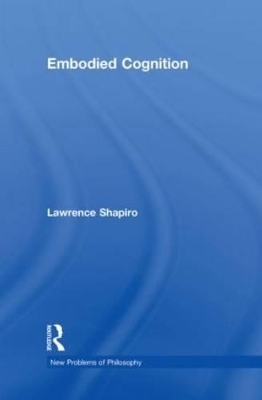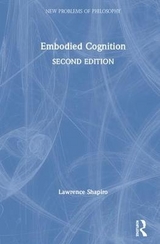
Embodied Cognition
Seiten
2010
Routledge (Verlag)
978-0-415-77341-6 (ISBN)
Routledge (Verlag)
978-0-415-77341-6 (ISBN)
- Titel erscheint in neuer Auflage
- Artikel merken
Zu diesem Artikel existiert eine Nachauflage
Embodied cognition often challenges standard cognitive science. This title deals with the central themes and debates surrounding embodied cognition. It outlines the theoretical and methodological commitments of standard cognitive science, and examines philosophical arguments surrounding the traditional perspective.
Embodied cognition often challenges standard cognitive science. In this outstanding introduction, Lawrence Shapiro sets out the central themes and debates surrounding embodied cognition, explaining and assessing the work of many of the key figures in the field, including George Lakoff, Alva Noë, Andy Clark, and Arthur Glenberg.
Beginning with an outline of the theoretical and methodological commitments of standard cognitive science, Shapiro then examines philosophical and empirical arguments surrounding the traditional perspective. He introduces topics such as dynamic systems theory, ecological psychology, robotics, and connectionism, before addressing core issues in philosophy of mind such as mental representation and extended cognition.
Including helpful chapter summaries and annotated further reading at the end of each chapter, Embodied Cognition is essential reading for all students of philosophy of mind, psychology, and cognitive science.
Embodied cognition often challenges standard cognitive science. In this outstanding introduction, Lawrence Shapiro sets out the central themes and debates surrounding embodied cognition, explaining and assessing the work of many of the key figures in the field, including George Lakoff, Alva Noë, Andy Clark, and Arthur Glenberg.
Beginning with an outline of the theoretical and methodological commitments of standard cognitive science, Shapiro then examines philosophical and empirical arguments surrounding the traditional perspective. He introduces topics such as dynamic systems theory, ecological psychology, robotics, and connectionism, before addressing core issues in philosophy of mind such as mental representation and extended cognition.
Including helpful chapter summaries and annotated further reading at the end of each chapter, Embodied Cognition is essential reading for all students of philosophy of mind, psychology, and cognitive science.
Lawrence Shapiro is Professor in the Department of Philosophy at the University of Wisconsin—Madison, USA. His research currently focuses on the issues and debates around embodied cognition. He is editor (with Brie Gertler) of Arguing About the Mind (2007), also available from Routledge.
Introduction 1. Standard Cognitive Science 2. Challenging Standard Cognitive Science 3. Conceptions of Embodiment 4. Embodied Cognition: The Conceptualization Hypothesis 5. Embodied Cognition: The Replacement Hypothesis 6. Embodied Cognition: The Constitution Hypothesis 7. Concluding Thoughts. Glossary. Notes. Bibliography. Index
| Erscheint lt. Verlag | 9.8.2010 |
|---|---|
| Reihe/Serie | New Problems of Philosophy |
| Verlagsort | London |
| Sprache | englisch |
| Maße | 156 x 234 mm |
| Gewicht | 528 g |
| Themenwelt | Geisteswissenschaften ► Philosophie ► Erkenntnistheorie / Wissenschaftstheorie |
| Geisteswissenschaften ► Psychologie ► Allgemeine Psychologie | |
| Geisteswissenschaften ► Psychologie ► Verhaltenstherapie | |
| ISBN-10 | 0-415-77341-5 / 0415773415 |
| ISBN-13 | 978-0-415-77341-6 / 9780415773416 |
| Zustand | Neuware |
| Informationen gemäß Produktsicherheitsverordnung (GPSR) | |
| Haben Sie eine Frage zum Produkt? |
Mehr entdecken
aus dem Bereich
aus dem Bereich
die Grundlegung der modernen Philosophie
Buch | Softcover (2023)
C.H.Beck (Verlag)
CHF 25,20
Buch | Softcover (2023)
Reclam, Philipp (Verlag)
CHF 9,80


![Was heißt Denken?. Vorlesung Wintersemester 1951/52. [Was bedeutet das alles?] - Martin Heidegger](/media/113619842)
